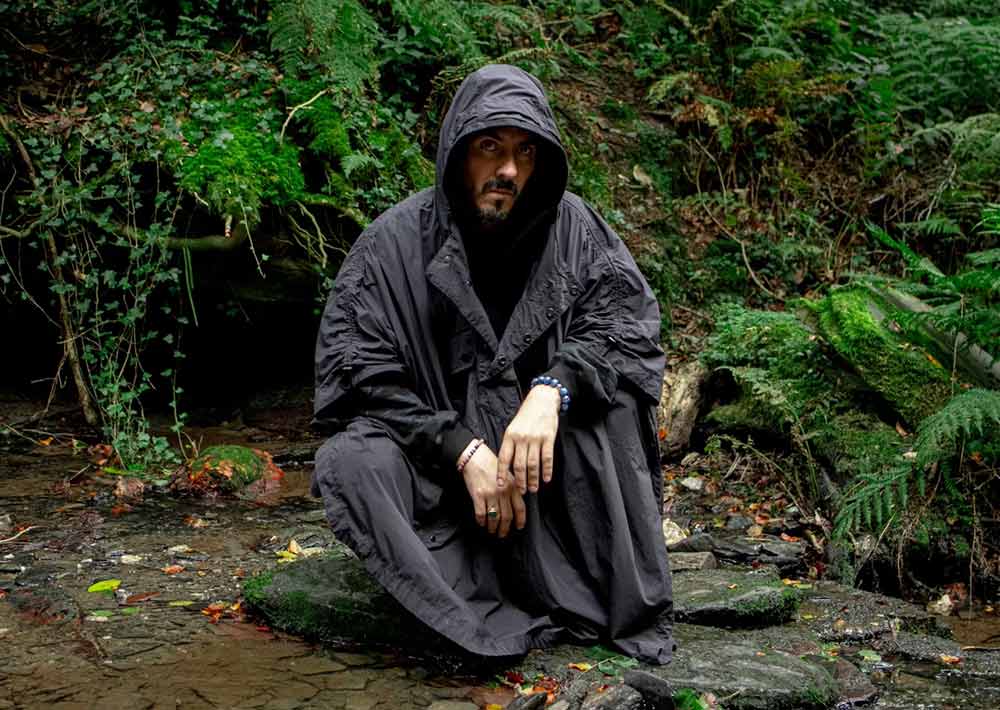
Dhani Harrison: “If you’re not having fun, you’re not getting the message across anyway.” Photo: Josh Giroux
Born during lockdown, Graham Coxon, Liela Moss, Mereki and others helped the songwriter bring his second solo album to life
Rather than look at each project in isolation, the best way to understand Dhani Harrison’s output is to see everything as part of a multifaceted world being built by the musician. His career has taken in bands Thenewno2 and Fistful Of Mercy, as well as collaborations with artists such as Wu-Tang Clan, UNKLE and Sabina Sciubba. Harrison is also a talented composer, often working with Paul Hicks, and has created music for both television and film, including scores for the motion pictures Seattle Road, Learning To Drive and Beautiful Creatures. Running the revived Dark Horse Records, he has played a key role in releasing material by George Harrison, Cat Stevens/Yusuf, Joe Strummer, and many more.
Out of such a tangled web of creativity, it’s possible to find the threads that run through his second solo album, INNERSTANDING. A keen collaborator whose music is as immersive as it is meaningful, the record sits in the middle of a Venn diagram combining trip hop, grunge, and cinematic scores. Drawing from an incredibly deep bench, Graham Coxon, Liela Moss, Mereki, Jeff Wootton, Nick Fyffe all lend their considerable talents to the album. With a focus on the environment and the power of community, there’s plenty of light shining through the ominous industrial tones of songs like New Religion and Right Side Of History.
Having previously spoken to Harrison about his debut solo album IN///PARALLEL, we were keen to catch up with the songwriter and learn all about his new record…
Read our previous interview with Dhani Harrison in 2017
When we spoke to you back in 2017 you mentioned your love of the Bristol music scene. We could definitely hear its influence on INNERSTANDING…
“I guess, I’m shameless about it in terms of every bit of music that I’ve ever made… I love girl singers and I love to hear dirty stuff, I listen to a lot of Tricky which is part and parcel of what happened on this record. Graham Coxon was my favourite guitar player, and his guitar sounds like a monster. And that’s what I said, ‘I don’t want it to sound like distortion, I want it to sound like a scary monster in the other room.’
“So between Tricky and that side of Blur and then Wu-Tang and stuff… I also love crusty, grungy samples and guitar tones. I love Nirvana’s Bleach, that was one of my favourite records. Anything that’s raw and dirty. Also, there is kind of a hip hop feel on this record as well. Not the way the songs go, but it’s in the production. I definitely came at it from a more sample-based perspective.”
Did that change the way the songs started?
“With In///Parallel I went and toured it with ELO so much. It’s a quite a sensitive, emotional, soundscape-y record and it was not necessarily the most fun time you can have on stage. When I go and watch Idles or Wet Leg, they seem like they are having more fun. So I just thought, ‘This record, whatever it is, it’s gonna have to start from a perspective where I want to kind of move around, make me move my feet.’ Whatever happens after that, I’m making it for my own experience – I know we’re going to tour this at some point. I want to have fun. It doesn’t matter what the message is. If you’re not having fun, you’re not getting the message across anyway.
“You can have a quite an intense record, and a record that’s about healing and love, but it can also slap. So that’s kind of from that perspective. I’ve been doing a lot of film scores, and I don’t really see songs as songs anymore. I just see them as, ‘I want to get from here to here, and I want to feel this.’ If you have a hook and it catches and there are some things that resonate with people, then that’s great. But if I can put the whole album on from start to finish and go through a series of emotions and get to the end, and if it’s been a transformative thing, then I feel happy about that.”
How did you get from nothing to something?
“The first time I started writing for this, there was little bits of stuff that I had saved and I was like, ‘This is too good to not put on a record but I don’t know what it is?’ Bits like La Sirena and Ghost Garden and things like that had come from bits of scores that I was trying to, but they’d never been used and I’d always loved them and they got stuck in my head.
“Then the rest of the stuff, I was stuck out in Australia for lockdown. My partner is Australian and we were visiting her family and we got stuck. I went for ten days and I ended up there for three or four months. Paul Hicks, who I compose with, he was in LA and I sent a laptop over to his house, I was like, ‘Stick everything on it and send it me, because I can’t leave.’ So we managed to do that. I got this fresh laptop in the mail and I opened it up and the first thing I did was to start writing.”
And these were the songs for the album?
“The first thing I did the first day was Dangerous Lies. I started with a weird robot voice doing stream of consciousness stuff and then programming beats. I had a weird 12-string acoustic that I’d been allowed to buy from the store. Music was an essential business in Australia [during lockdown], not in other countries. But in Australia it was surfing and music, which was why it was really good to be there. At the beginning, Australia didn’t really care about anything and it was all really fun. Then later on, they became the most strict.
“So I started writing, I use Battery on my Logic and I like building beats and playing weird 12-string acoustic. I love the blues so much and I love Lead Belly. For New Religion, I was sitting there thinking about those old songs like [You Must Have That True Religion], ‘Then I will have that true religion, halleluj halleluj.’ It all broke down into these little bits, modules of what I was enjoying. I guess that was the same for everyone who had got stuck in lockdowns.”

Dhani Harrison: “One of the only people that would leave the house and come and make music was Graham Coxon.”
In terms of their listening taste?
“People were revisiting all these things that made them feel something, feel safe or feel the way they wanted to feel – nostalgic or whatever. I started plugging away and it was mostly vocal stuff that I was doing. We also had a lot of time to do programming, as a lot of the record was programming.
“I came back to England just before lockdown two and then it was long winters and lockdowns. One of the only people that would leave the house and come and make music was Graham Coxon. Graham and I just started playing together a lot. We did a cover of Tom Petty’s Love Is A Long Road for this tribute concert, it was a memorial to Tom.
“He was about to start [his group with Rose Elinor Dougall] The Waeve, and I didn’t even know that Blur were doing Ballad Of Darren, I don’t think they’d even done that yet or had an idea to do that Blur reunion. So we were mucking about and then carried on recording. He ended up coming down with saxophones and guitars and we threw down lots of weird stuff. It was our way of supporting each other and enjoying making music again.”
When you were writing the lyrics, did you have Liela and Mereki in mind?
“The last thing Liela and I did together… I did a remix for her or I was on her last record Internal Working Model. Before that, we’d done UNKLE together, so we did a couple records. Mereki and I obviously did, In///Parallel where we met and then we I was in her band for a while and I played on her record, Death Of A Cloud, which was one of my favourite records of this year.
“They [INNERSTANDING and Death Of A Cloud] kind of live in the same world, because they were recorded in the same place with the same people. Her song Presence and my song New Religion are linked brothers and sisters and it just grew from there.
“I didn’t really write with her until I was done and I wanted to do it like I’d done with the last record where I had everything done and then I was like, ‘Right, just go and do your magic. Write a verse here. Put a bridge here. Let’s co-write some lyrics…’ She’s an incredible writer, so I just let her do her thing.’”
Was that the same with Liela?
“Whenever Liela opens her mouth, it sounds like a record comes out. She has a fully produced and mastered voice. She sounds like she’s been through the mastering lab, you know, when she opens her mouth.
“During October 2021, lots of people were scared to come out, it was a mess. Everyone had different levels of COVID anxiety, which is now a syndrome. We needed to get everyone back on the same page and so we did a weeklong event in the countryside. I organised it and it was loads of people from Duke Spirit, some of my old band, some of the guys from Radiohead and Supergrass, people from UNKLE, all different walks of life, a bunch of different bands.
“We spent the mornings doing some sort of healing exercise and we’d spend the evenings playing music. We put up a yurt and everyone sat in this yard and, by the end of the week, everyone was completely back to normal, hugging and feeling great.”
That sounds wonderful…
“We’d do dinner every night, and everyone would talk about how they felt, what they’d been through or what they had to cancel that year; the tours that they lost or the albums that were they were making. We all just ended up playing together. Jeff Wootton from Gorillaz was there and he ended up playing on the record, and Mereki and Liela. It was all starting to form a community again. It was the best thing we’ve ever done.
“We’re all musicians, and we’re all quite sensitive people. We all know the impact COVID had on mental health and suicide and everything. We know what it’s done. This was very, very helpful for everyone that was there. We were having musical therapy.”
Do you think that some of those themes, people who are closely listening to INNERSTANDING will pick up on in the lyrics and the sort of ominous mood?
“I think if you were in England during that period of time, or in America, but I think there’s a different perspective now in America, it seems a bit more broken. The media is so prominent out there, I feel like England has a different perspective. I feel like England has done a really good job, and has been very supportive, and understanding of everyone’s different needs and values.
“People accept each other more here, there’s less of a shaming culture. It’s less divisive, because of the media, or at least English are just more resilient to the divisiveness. Maybe it’s that ‘blitz spirit’ where it’s like we, ‘Keep calm and carry on,’ or just don’t freak out and let’s be nice to our friends.
“We were given a choice whether to choose isolationism or community. Where I was, we chose community. My community here has benefited greatly as a result and my music community. People are more open now. We’ve all seen each other have a hard time and people are more supportive. I think we all got to speak in our different ways. I’ve got 10 friends who made records during COVID and we all say the same things in a different way. Mine are just coming out my way.”
Is the music that you write different depending on whether you’re in this country or you’re in America? Does that change your approach or the final sound?
“I think it has to yeah. I lived in LA for the last 20 years and I moved back here after lockdown one. I’ve been here now for nearly four years. I love being back here and I loved being in LA. My mum’s from LA, I grew up there. But I lost my grandma at the beginning of 2020. She was 101 and she had a very wonderful exit. And that was kind of the thing that was really making me stay in LA. Because she was my best friend.
“I’m so happy to be a part of what’s happening now, seeing Graham go back out. I went to see him at Wembley and it blew my mind. It’s like the happiest I’ve ever seen England. It was one of the best things I’ve ever seen. And then Sleaford Mods and Billy Nomates and Liela’s solo album and seeing what Idles been up to. Even the last two years at Glastonbury, I’ve been doing a lot of stuff at Glasto, seeing The Chemical Brothers still slaying it, and Four Tet and people like that.”
Do you find that inspiring?
“It makes me feel like there is actually a sound here at the moment, which I haven’t felt for a while. I felt like the energy was very much in Los Angeles and now I feel like it’s very much here. I’m glad that I managed to get in there just at the last minute, under the bar, to start being my true self here again.
“I’d never even played a solo show in England until the other week. That was my first gig of my own solo music. I’ve played massive shows and I’ve played with loads of big bands, but that was my first solo show.”
Will you be touring the record?
“Yeah, definitely. And I love playing in Europe and stuff, but we wanted to do something and release this record digitally first. The vinyl is coming very soon. With supply chains and everything, vinyl takes nine months. I work a lot with my catalogue label Dark Horse, we have a great art department and great vinyl producers.
Are you under any commercial pressure from BMG or HOT records?
“HOT is just ‘Henley-on-Thames’, a record label that my dad started when he moved to Henley. I resurrected it.”
How about BMG?
“I love the pressure that they put on me. They’re always very encouraging of me doing new stuff. And this project, we’re doing a lot of stuff with Dolby with Atmos. We did the whole album in spatial. Paul Hicks who I work with, my composing partner, who has re-mastered The Beatles and The Stones, you name it. He did the Love show in Vegas and that kind of paved the way for Dolby Atmos to exist, because that was the Dolby Theatre. So that was kind of how that came into being. So he’s a monster when it comes to mixing. I look forward to doing some really far-out spatial stuff with this record.
“There’s not so much a conventional release cycle. Everything’s a one-week cycle now. So how do you have longevity? This record will keep going; there’s going to be bits plugging into it. We recently filmed the whole thing from start to finish in the round at a soundstage in London. So that’s in the works, I’m mixing and editing. I did that with the last record. I always like to see the whole thing from start to finish.
Any final thoughts on the album?
“It makes me happy to be able to talk about the record because I want people to have access to themselves, their emotions or whatever… healing is necessary to go to where we’re going next. If that’s getting angry, or if that’s being happy, we have to be able to master that.
“I’m really happy with the way this thing turned out because we have to process all of these things. There’s been so much to process in the last three years. Everyone’s just onto the next thing every week, and that’s not healthy for us. Having this continuous dread-news cycle that changes the enemy every five seconds, and requires us all to have this massive response every time, that’s not good for your minerals. That’ll wear you out. I think getting back to playing loud music and chatting about it, that’s better for us than social media.”



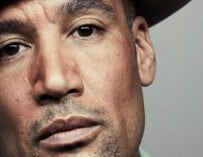
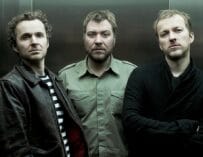


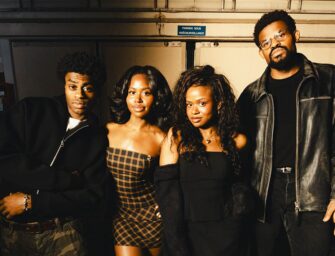


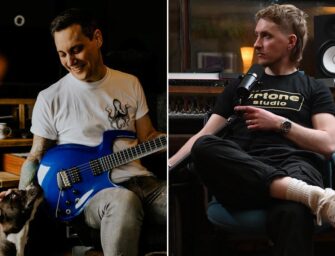























Related Articles